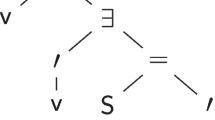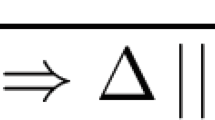Abstract
This article is the thirty-second of a series of articles discussing various open research problems in automated reasoning. The problem proposed for research asks one to find a variant of the inference rule hyperparamodulation that avoids generating many of the binary paramodulants ordinarily deduced.
Similar content being viewed by others
References
Anderson, R.: Completeness results for E-resolution, inProc. AFIPS 1970 Spring Joint Computer Conference, vol. B36 (1970), pp. 653–656.
Brand, D.: Proving theorems with the modification method,SIAM J. Computing 4 (1975), 412–430.
Peterson, G. E.: A technique for establishing completeness results in theorem proving with equality,SIAM J. Computing 12 (1983), 82–100.
Robinson, G. and Wos, L.: Paramodulation and theorem-proving in first-order theories with equality, in B. Meltzer and D. Michie (eds),Machine Intelligence 4, Edinburgh University Press, Edinburgh, 1969, pp. 135–150.
Robinson, J.: Automatic deduction with hyper-resolution,Internat. J. Computer Math. 1 (1965) 227–234.
Wos, L.:Automated Reasoning: 33 Basic Research Problems, Prentice-Hall, Englewood Cliffs, New Jersey, 1988.
Wos, L. and McCune, W.: Negative hyperparamodulation, in J. Siekmann (ed),Proc. Eighth Internat. Conf. on Automated Deduction, Lecture Notes in Computer Sci., 230, Springer-Verlag, New York, 1986, pp. 229–239.
Wos, L., Overbeek, R., and Henschen, L.: Hyperparamodulation: A refinement of paramodulation, in R. Kowalski and W. Bibel (eds),Proc. Fifth Internat. Conf. on Automated Deduction, Lecture Notes in Computer Sci. 87, Springer-Verlag, New York, 1980, pp. 208–219.
Wos, L., Overbeek, R., Lusk, E., and Boyle, J.:Automated Reasoning: Introduction and Applications, 2nd edn, McGraw-Hill, New York, 1992.
Wos, L. and Robinson, G.: Maximal models and refutation completeness: Semidecision procedures in automatic theorem proving, in W. Boone, F. Cannonito, and R. Lyndon (eds),Word Problems: Decision Problems and the Burnside Problem in Group Theory, North-Holland, New York, 1973, pp. 609–639.
Wos, L. and Robinson, G.: Paramodulation and set of support, inProc. IRIA Sympos. on Automatic Demonstration, Lecture Notes in Math. 125, Springer-Verlag, New York, 1970, pp. 276–310.
Author information
Authors and Affiliations
Additional information
This work was supported by the Office of Scientific Computing, U.S. Department of Energy, under Contract W-31-109-Eng-38.
Rights and permissions
About this article
Cite this article
Wos, L. The problem of hyperparamodulation. J Autom Reasoning 12, 265–271 (1994). https://doi.org/10.1007/BF00881890
Received:
Issue Date:
DOI: https://doi.org/10.1007/BF00881890




